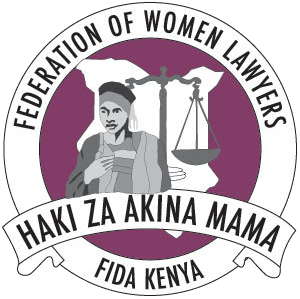
The Access to Justice programme seeks to facilitate women to access justice through: legal representation, Self-representation; engaging in Strategic Impact Litigation (SIL) to set new jurisprudence; administration of pro-bono lawyers’ scheme, and alternative dispute resolution mechanisms such as mediation and couple therapy. The access to justice programme also encompasses the informal justice system.
The program aims to achieve the following specific objectives
Due to the high demand for legal representation, the Pro -bono scheme aims to increase and expedite quality access to justice by assisting FIDA-Kenya legal counsels to attend to more clients. Pro Bono Lawyers volunteer their services especially in the hard to reach areas, and on matters where clients do not strictly meet the criteria for free legal services.
In the matter of the Estate of A.K.M– Succession Cause No.48 of 2014, A widowed FIDA-Kenya client was facing eviction from her matrimonial home. Her in-laws and step-children had ganged up against her and wanted to take away her property.
FIDA-Kenya referred her to a pro-bono lawyer who took up the matter, and obtained letters of Administration intestate which allowed the client to manage her late husband’s estate. The letters were later confirmed giving the aggrieved legal authority to manage and benefit from her matrimonial estate.
To date, FIDA-Kenya continues to engage Pro -bono lawyers to execute its mandate.
Kenya has embraced Strategic Impact Litigation (SIL) as an avenue to address widespread and systemic human rights violations as well as matters of social injustice in the country.
Through Mediation, and partnership with the Traditional Justice System, FIDA- Kenya continues to advocate for out of court settlements.At FIDA-Kenya, Mediation is offered as the first Alternative Dispute Resolution mechanism as a way of settling family disputes.
Once a client walks into the office, an in-house Lawyer assesses the client’s mental, and emotional capacity. Once deemed fit for mediation, the client is issued with a Mediation invite letter that seeks to have the second party attend and participate in the voluntary mediation process. Should the invited party accept a meeting and schedule of a session, a trained and certified mediator will be engaged as the third party and a mediation session is conducted.
Upon the resolution of the disputes, an agreement is entered by the first and second party, the decision is final. From here, a mediation agreement form prepared. This decision is binding upon the parties and is recognized as such by a court of law.
In 2019, FIDA-Kenya’s Mediation program attracted about 2,000 mediation requests that have been made in the three regional offices of Nairobi, Kisumu, and Mombasa. Of these, the organization has recorded a 70% success rate.
Not only is Mediation an inexpensive form of justice, it also offers an opportunity for the parties to amicably agree on the best settlement, mends relationships, and strengthens families.
All three offices of FIDA-Kenya have maintained weekly screenings for walk-in clients.
The clinics are available to people from all walks of life as follows;
- Nairobi Office, Monday-Wednesday 8:00 AM-1:00 PM
- Mombasa Office, Monday-Tuesday 8:00 AM-1:00 PM
- Kisumu Office, Monday- Tuesday 8:00 AM-1:00 PM
Upon screening of a client, assessment is done to determine the help that should be offered to the nature of the case, the client is given directions and engaged formally to determine the course to be followed in the pursuit of justice.
FIDA-Kenya does not discriminate on any basis whatsoever.
Self-representation is recognised as one of the most innovative FIDA-Kenya interventions. This initiative aims at equipping the clients with skills to represent themselves in court with the remote help of a lawyer.
This programme has efficiently helped more women access justice while honing their skills in arguing their case(s).
This program empowers women emotionally and psychologically to face life’s challenges by determining the best coping strategies for each. Nurturing coping abilities enables survivors to take up risks that contribute to improving their lives and those of their children.
Emotional imbalances are overcome as women increasingly take charge of their lives. The program is implemented through individual, and group therapy sessions.
Individual counseling sessions are offered on a case to case basis, while group therapy sessions are held over a period of six to eight weeks with meetings being held once a week. By the end of the program, most participants feel more optimistic, bear the ability to develop lasting and healthy relationships, have self-control, and can manage their anger.
They are flexible to change and lastly, they have self-fulfillment. This change is imperative for personal growth and development especially given the central role of women in the society.
